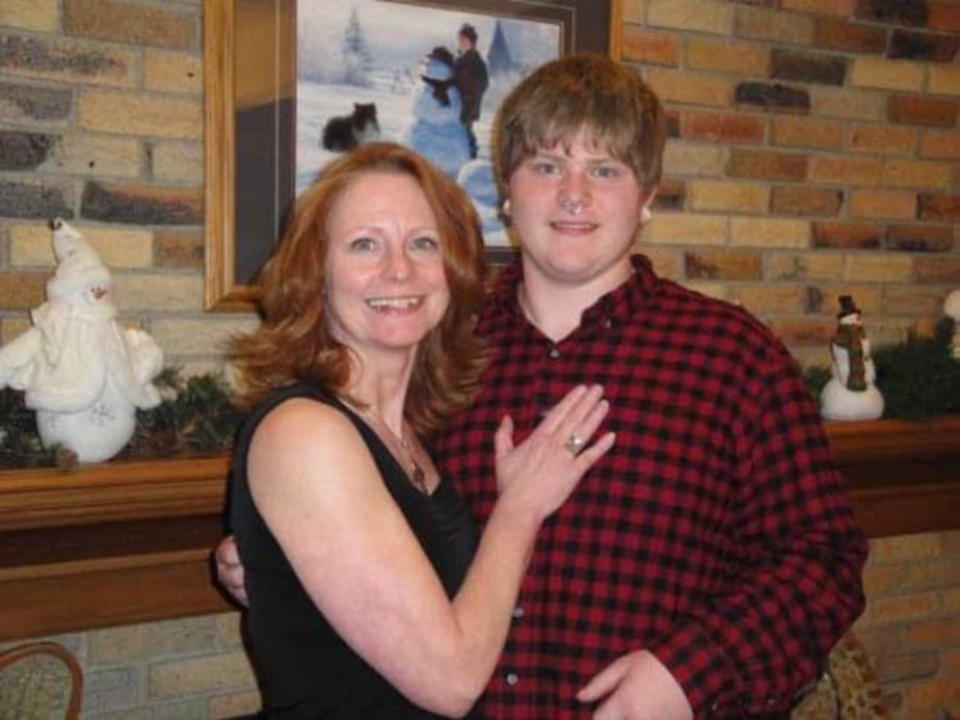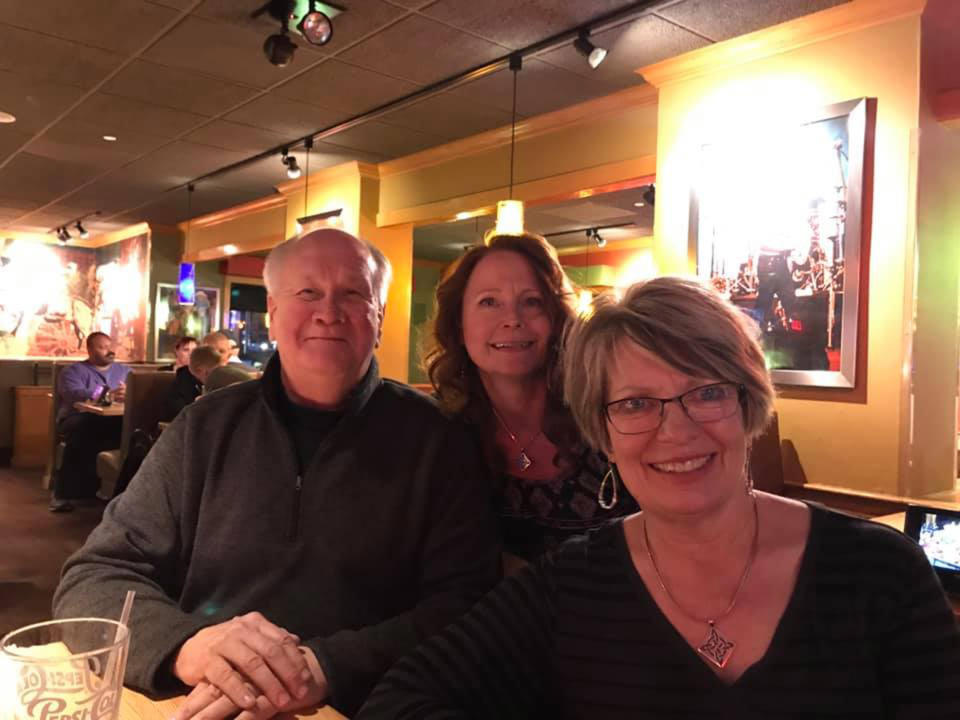I Met My Birth Son Once, Then He Died. His Adoptive Dad Helped Me Grieve
Candace Cahill is the author of the new memoir, "Goodbye Again," about losing her son twice. November is National Adoption Month. Below is a personal essay she wrote for TODAY about how her birth son's adoptive father helped her grieve after his passing.
I met David through his words. Handwritten in blue ink on yellow legal paper. Slanted, messy penmanship. A few crossed-out words. Familiar. Easy. As if it had been a spur-of-the-moment decision to write the letter.
All the other letters were typed, double-spaced, sans serif. Not a single flourish. Nothing to draw attention, which only heightened the intimacy of David’s letter — handwritten with love.
The scripted message began: Dear Birthmother.
The phrases unfolded, painting vivid images of comfort and plenty, and it was as if he sat before me, leaning in to hold my hands. Not a stranger, but a confidant. Or a confessor. Five pages of intimate details — reasons to choose him and his wife, Jane — a sales pitch for the most important job in the world.
Because I wasn’t a birthmother — yet.
I was eight months pregnant: young, alone and uncertain of so many things. Months of crisis pregnancy “counseling” had pointed out the reality of my situation — a history of abuse and neglect, drug addiction and alcoholism, poverty — and I finally conceded I was in no position to raise a child. The pain of that admission, almost too much to bear, was eased by the ability to choose my replacement: Picking the parents who would adopt my baby felt like a semblance of control in an uncontrollable situation.
David’s letter addressed everything my 20-year-old self considered important. His background and relationships with his parents, his siblings, his wife. The joys of his first child — also adopted. Beliefs on religion, education and punishment. His life appeared idyllic and beautiful. And from his words, I built an imaginary world around him, placing my child squarely in the middle.
Three months later, at the adoption agency, I came face-to-face with David’s ruddy cheeks and tear-filled eyes. I was allowed only a single meeting, where I hoped to see if they’d achieved, or better yet surpassed, the fantasy in my mind. Our infant son, christened Michael, was absent for fear his presence would be too painful for me. Jane, the “other mother,” faded into the background, ghost-like. I now can see neither of us was capable nor willing to acknowledge the other. John, Michael’s 4-year-old brother, all smiles, dimples and staticky hair, bubbled with laughter.
Tears leaked from the corners of David’s eyes, yet he appeared unashamed and relaxed, displaying vulnerability and emotion I’d never seen before in a man. He apologized, stating he cried frequently and that he hadn’t intended to make me uncomfortable.
“My dad cries all the time,” John piped up from coloring knights and armored horses. “They’re tears of joy.”
And with those few innocent words, David’s superhero-like persona solidified in my heart. I left the meeting, my gut churning and chest on fire, but confident Michael’s future without me was secure.
Eighteen years passed before I spoke to David again, this time by phone. He told me how amazing Michael was before the rustling of the receiver morphed into a voice I never expected to hear: the voice of my son, now an adult.

From then on, Michael controlled the pace and flow of contact, and two too-long years later, at Michael’s request, my husband and I traveled 2,500 miles to meet him. Sadly, Jane had passed away years before, so David and Michael, standing side by side, greeted us from their front doorstep, smiling. David, and then Michael, engulfed me in a hug and our lives came together like a single-day desert bloom. David’s eyes, now framed with deep creases, glittered as I remembered, and I witnessed his gentleness and compassion manifested in Michael, whose face was a mirror of my own. Nature and nurture on full display.
It would be another three years before I saw David again. This time, we stood over our son’s lifeless body, both of us lost and confused. Michael had died in his sleep, of natural causes. Two autopsies had been done, but neither came back with a reason for his passing.
In the months to follow, my raw trauma subsided but the gaping wound of losing him a second time refused to scab over. I didn’t know how to survive the onslaught of pain. I tried to access grief groups for parents, but they always asked what Michael was like, and I … didn’t … know. The regret and shame of this reality clogged my throat like sewage.
I turned my attention to birth parent support systems, hoping another first mother could help, but I didn’t seem to fit there either.
Then, I thought of David.
I reached out tentatively via email. I asked how he and the family were holding up. I reiterated my gratitude for the welcome we received at the funeral. I tried to express how honored I felt that they made space for us at the Irish wake, in the front row of the chapel and next to him at the gravesite. And I ended with the most vulnerable thing I think I’ve ever admitted: how lost and alone and empty I felt.
He wrote back immediately. And just like 23 years before, it felt as though he leaned in to take my hands, and the thousands of miles between us disappeared.
David admitted to his own struggles. How his tears made people uncomfortable, how going to work was a distraction — sort of. How he relived the loss every day he met acquaintances on the street or in a store, and that he was thinking of moving away for a while.
He told me that Michael had made us family.

Our letters flowed back and forth, both painful yet effortless, and this became one of many lessons I was destined to learn about the dichotomy of grief.
Before the first anniversary of Michael’s death, David invited us to visit. When we arrived, he met us at the door, the tears in his eyes familiar. Familial. When he poured glasses of Freakshow Cabernet Sauvignon, Michael’s favorite wine, the floodgates opened.
The next morning, we visited Michael’s grave. I whispered to him how much I wished I could have kept him; my relief that David had been his dad; and how glad I was to finally get to know his family. That afternoon we poured over photo albums, then progressed to Michael’s room, where David piled keepsakes into my arms, knowing they ached for my son.
In the years to follow, my husband and I would visit each fall, and in 2018, when David brought his extended family on a trip to my home in Alaska, it was as close as I’ve ever felt to having my son with me.
I know that when David looks at my face, he sees his son’s reflected back, while for me, David contains all that remains of my son. Our son. Every scraped knee, snorted laugh and awkward silence. And each memory he shares is a gift, which I open with care, caress with gratitude and cherish with abandon.
This article was originally published on TODAY.com

